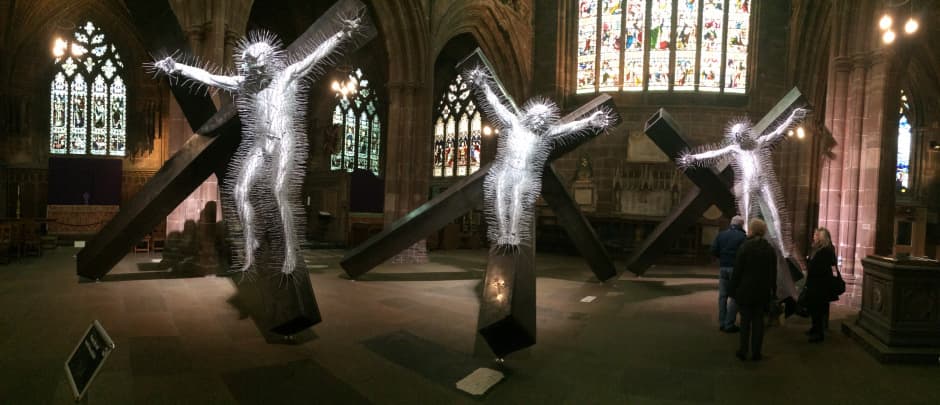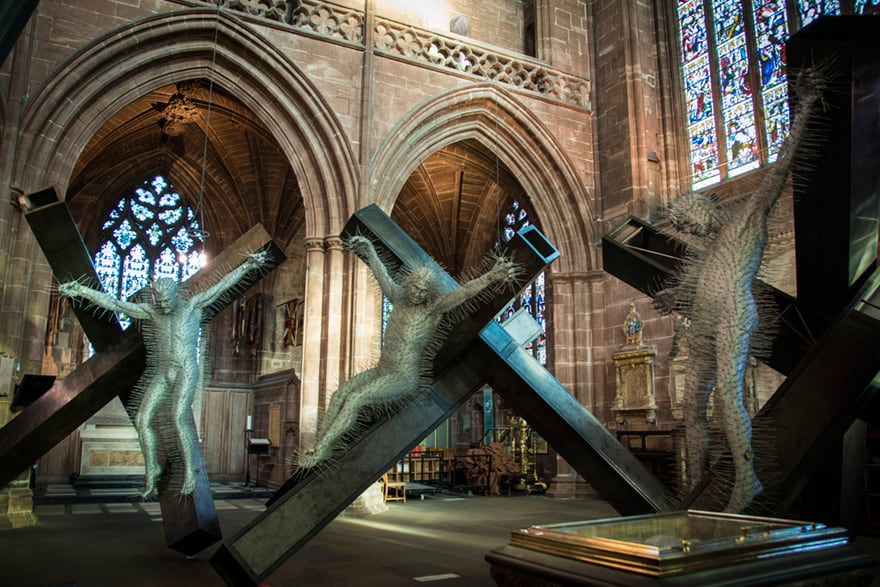April 10: At the Cross
♫ Music:
Day 41 - Monday, April 10
Jesus is Nailed to the Cross
Scripture: John 19:16-22; Luke 23:34-36
So they took Jesus, and he went out, bearing his own cross, to the place called The Place of a Skull, which in Aramaic is called Golgotha. There they crucified him, and with him two criminals, one on either side, and Jesus between them. Pilate also wrote an inscription and put it on the cross. It read, “Jesus of Nazareth, the King of the Jews.” Many of the Jews read this inscription, for the place where Jesus was crucified was near the city, and it was written in Aramaic, in Latin, and in Greek. So the chief priests of the Jews said to Pilate, “Do not write, ‘The King of the Jews,’ but rather, ‘This man said, I am King of the Jews.’” Pilate answered, “What I have written I have written.” And Jesus said, “Father, forgive them, for they know not what they do.” And they cast lots to divide his garments. And the people stood by, watching, but the rulers scoffed at him, saying, “He saved others; let him save himself, if he is the Christ of God, his Chosen One!” The soldiers also mocked him, coming up and offering him sour wine and saying, “If you are the King of the Jews, save yourself!”
Poetry:
"Godly Sorrow Arising from the Sufferings of Christ"
by Isaac Watts
Alas! And did my Saviour bleed,
And did my Sovereign die?
Would he devote that sacred head
For such a worm as I?
Thy body slain, sweet Jesus, thine,
And bath’d in its own blood,
While all expos’d to wrath divine
The glorious Sufferer stood.
Was it for crimes that I had done
He groan’d upon the tree?
Amazing pity! Grace unknown!
And love beyond degree!
Well might the sun in darkness hide,
And shut his glories in,
When God the mighty Maker dy’d
For man the creature’s sin.
Thus might I hide my blushing face
While his dear cross appears,
Dissolve my heart in thankfulness,
And melt my eyes to tears.
But drops of grief can ne’er repay
The debt of love I owe;
Here, Lord, I give myself away,
‘Tis all that I can do.
AT THE CROSS
“Ye who think of sin but lightly, nor suppose the evil great;
Here may view its nature rightly, here its guilt may estimate.”
The literal and symbolic weight of sin that Jesus endured is a thing upon which I often avoid looking. On this day, in these hours, Jesus bore the weight of his own cross, the worldly shame of association with criminals, the indignation of the Jews at his claims to a kingdom, the theft of his garments, the mocking words of the seemingly powerful, and the denial of his power to save even himself. I don’t want to believe that my sin, and the sin of humanity, is why he endured this weight. Deep in our souls we turn away from facing the darkness within, the capacity we have for evil.
The soldiers cast lots for Jesus’ clothing. This was not the first time Jesus’ garments are mentioned in the gospels. In Matthew 9:20-22, we read an account of a woman who had “suffered from a discharge of blood for twelve years.” She touched the hem of his garment, saying to herself, “If I only touch his garment, I will be made well.” Jesus turned to her, who would have been considered unclean, and said, “Take heart, daughter; your faith has made you well.” And she was made well. What a sight then, to see perhaps this same garment being gambled for, fought over in front of the cloak’s owner as he dies on a cross. We don’t see faith demonstrated in the soldiers’ interactions with this garment; instead we see greed, callousness, the depth of human depravity. Am I willing, at the cross, to acknowledge the depth of my greed and callousness?
The chief priests balked at the idea that Jesus actually was the King of the Jews. The rulers scoffed at his ability to save. But just days before, Jesus was celebrated in a triumphal entry – the Jews cried out in the streets, “Hosanna in the highest!” and “Blessed is the King who comes in the name of the Lord! Peace in heaven and glory in the highest!” At Golgotha, we don’t see this same worship and honor that is due him, or faith in his salvation; instead we see denial and indignation at the thought of Jesus’ kingship and power to save. Am I willing, at the cross, to acknowledge the ways I deny Jesus as King and Savior?
“Father, forgive them,” Jesus said, “for they know not what they do.” What grace, that in the midst of this scene of human depravity and sin, Jesus forgives. He attends to the limitedness of humanity, even when he could have cried out for righteous justice. He pleads for our forgiveness with the Father, and he pays for our forgiveness with his death.
PRAYER
Lord, help us in your mercy to know what we have done and continue to do. We cling in the midst of our infirmity to your garment of salvation. Forgive us for greedily and callously clinging to worldly comforts. Forgive us for mocking you in the small and large ways we deny you as King and Savior. You alone have the words of life. Only say the word, and we shall be healed.
Amen.
Carrie Stockton
Dean of Student Success
Enrollment Management
About the Artwork:
Golgotha (2011) (2 views)
David Mach
Coat hangers & steel girders
Chester Cathedral, Cheshire, England
About the Artist:
David Mach (b. 1956) is a Scottish sculptor, installation artist, and collagist. He studied at the Jordanstone College of Art in Dundee, Scotland, and also at the Royal Academy of Art in London. Most of his sculpture and large-scale installation works are temporary in which he utilizes mass-produced, commonplace items. Golgotha shows the value of contemporary sculpture in reimagining a significant moment within the Christian story. It allows us to see Christ’s crucifixion in an unconventional light, giving a fresh outlook with its use of unorthodox materials. The use of recycled coat hangers and steel girders is, admittedly, unusual for the depiction of Christ's figure, a subject usually crafted in luxurious metals, like marble or gold. The several hundred coat hanger spikes that are inserted into each of the sculptures make for a raw depiction of a profoundly violent act. The spikes give another aura, energy and life, as if the figures are alive and moving, trembling in pain making the crucifixion even more violent and vivid.
http://www.davidmach.com/
About the Music:
“Stricken, Smitten, and Afflicted”
Lyrics:
[Verse 1:]
Stricken, smitten, and afflicted,
See him dying on the tree--
Tis' the Christ by man rejected;
yes my soul tis He, tis He.
Tis the long expected Prophet,
David's Son yet David's Lord.
By His Son, God now has spoken;
Tis the True and Faithful Word.
[Verse 2:]
Tell me ye who hear Him groaning,
Was there ever grief like His?
Friends, through fear
His cause disowning;
Foes insulting his distress.
[Verse 3:]
Many hands were raised to wound Him;
None would interpose to save.
But the deepest stroke that pierced Him,
Was the stroke that justice gave.
[Verse 4:]
Ye who think of sin but lightly,
Nor suppose the evil great,
Here may view its nature rightly;
Here its guilt may estimate.
[Verse 5:]
Mark the Sacrifice appointed;
See who bears the awful load.
Tis the Word, the Lord's Anointed,
Son of Man and Son of God.
[Verse 6:]
Here we have a firm Foundation,
Here the Refuge of the lost.
Christ, the Rock of our salvation
Is the Name on which we boast.
[Verse 7:]
Lamb of God for sinners wounded,
Sacrificed to cancel guilt.
None shall ever be confounded,
Who, on Him their hope have built.
About the Composer/Performer:
Fernando Ortega (b. 1957) is an evangelical Christian singer-songwriter and worship leader, heavily influenced by traditional hymns, as well as his family’s Albuquerque, New Mexico heritage. Much of his current inspiration comes from the North American Anglican liturgy. From the late 70′s to the mid 90’s, he served in music ministry at a number of churches in New Mexico and Southern California. It is from his heritage and classical training at The University of New Mexico where Ortega derives his sound, embracing country, classical, Celtic, Latin American, world, modern folk, and rustic hymnody. From 1993 to the present, Ortega has worked as a concert/recording artist and has released 14 albums.
www.fernandoortega.com
About the Poet:
Isaac Watts (1674-1748) English hymn writer, known as “The Father of Hymns,” wrote over 750 hymns of praise to God during his lifetime. Many of these hymns remain in use today and have been translated into numerous languages. Watts based many of his hymns on particular psalms since in the Church of England, only hymns from the Psalter were allowed.

